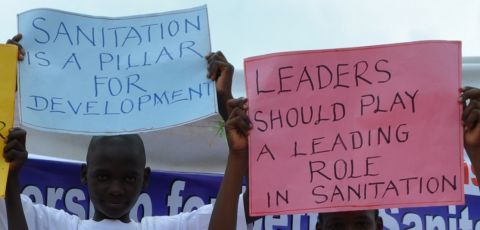
The Sustainable Development Goals: enough to end the sanitation crisis?
The MDGs did not succeed in ensuring everyone has access to safe sanitation- will the new SDG indicators on sanitation increase progress to ensure that everyone has their right to water and sanitation realised?
The Sustainable Sanitation Alliance (SuSanA), in partnership with End Water Poverty, is holding a 2 week thematic discussion on exploring whether the new SDG indicators on sanitation will address the gaps left by the MDGs and what the SDGs can do differently to ensure those most in need have their human right to water and sanitation realised.
Despite 15 years of action on the MDGs, the target for sanitation has still not been met. At least 2,3 billion people – one in three people globally – lack access to an improved sanitation facility. Many more lack access to sanitation that is culturally acceptable or affordable. An estimated 1 billion people are still forced to defecate in the open. Soon the SDGs will be adopted, setting a new development agenda for the next 15 years of development. Join our discussion which will explore what worked, and what didn’t in the MDG process, and how we can make sure that the SDGs do things differently, so as to prevent the same mistakes of the past. We will also explore how the SDGs will prioritise those most in need, and how civil society will monitor progress to ensure that the needs of the most vulnerable and marginalised are met.
Running for two weeks from Tuesday 1 September to Monday 14 September on the SuSanA online discussion forum, the discussion will look at a number of key issues relating to sanitation in the SDGs and within the post-2015 development agenda. Join us to post your questions, debate with lead experts in the field, and provide your insights and knowledge on the following issues:
- Theme I – SDG indicators: The MDGs did not succeed in ensuring everyone has access to safe sanitation – will the new SDG indicators on sanitation increase progress to ensure that everyone has their right to water and sanitation realised?
- Theme 2 – Prioritising those most in need: How do we ensure that the SDGs prioritise, and monitor progress, for those most in need of safe sanitation? How do we ensure that they realise the human right to water and sanitation?
- Theme 3 – Civil society’s role in monitoring: How can civil society contribute to the monitoring of the goals and targets? What will our role need to be to ensure improvements for all?
- Theme 4 – Safe versus basic sanitation: What is the difference between ‘basic’ and ‘safe’ sanitation? Why is this important? How do we ensure that we reach those most in need?
Leading the discussions, experts from the sector participating include amongst others:
– Ramisetty Murali, Convenor: Freshwater Action Network- South Asia (FANSA)
– Louisa Gosling, Programme Manager for Principles: WaterAid
– Graham Alabaster, Programme Manager: United Nations Human Settlements Programme (UN-HABITAT)
– Rose Osinde Alabaster, Operations Desk Officer: WaterLex
– Eddy Perez: Center for Global Safe Water, Sanitation and Hygiene at Emory University (Former Lead Sanitation Specialist, Water and Sanitation Program, World Bank)
– Tim Brewer, Policy Analyst: WaterAid
Please register to participate in the discussion. To view the discussion and post, visit the SuSanA Forum.
On the Forum, regular summaries of the discussion will be posted. A summary report of each topic, along with an overview synthesis of all issues from the discussion, will be available in late September on the End Water Poverty and SuSanA Forum websites. If you have any questions, please post on the forum itself, or contact us directly at [email protected] and [email protected]. We so look forward to hearing your contributions on this upcoming discussion!
Follow us on Twitter @EndWaterPoverty and @susana_org